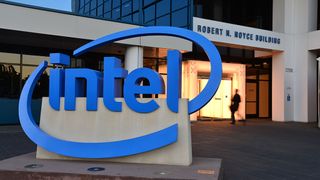Intel's $1.2B fine for antitrust, anti-AMD practises has been overturned in Europe
Accused of serving anticompetitive discounts, Intel has been appealing against the fine for 13 years.

After a 13 year battle, Intel has finally won out against a €1.06 billion ($1.2 billion) fine, over apparently serving anticompetitive discounts to it's manufacturers, giving them an unfair advantage against long-time CPU rivals, AMD.
Way back in 2009, practically the stone-age now, Intel was slapped with the antitrust fine by the EU. Its alleged crime? Handing out rebates for CPU purchases to OEMs such as Dell and HP "on condition that they bought all, or almost all, their x86 CPUs from Intel."
The court originally claimed Intel had been "engaging in illegal anticompetitive practices to exclude competitors from the market." Apparently Intel even "attempted to conceal the anti-competitive nature of practices," as noted by Engadget.
Of course, giving OEMs preferential treatment in order to specifically cut AMD out of the market is a pretty good way to piss off its rivals. Especially at a time when AMD was really struggling , too. Which is why the courts have taken so long to come to a decision; it's a very serious accusation to say that Intel were actively engaged in unfair practices aimed at blocking routes to market for its competitors in the chip business.
After the initial ruling, the big blue tech giant has made appeal after appeal, maintaining that its "actions were lawful and did not harm competition," and the case has been heard several times. The 2014 hearing didn't go so well for Intel, but in 2017 the highest court in the European Union ordered the fine to be re-examined. The company was still fighting the claims two years back, when we last covered the antitrust fine fiasco.

Best PC racing wheels : perfect for any circuit.
Best VR headset: which set is right for trackdays?
But finally Intel has gained victory in having the fine quashed—a fine which would have been the third-largest ever levied by the European Commission. There is still the potential for the latest decision to be appealed, but for now that's a big win for the blue corner.
If we're honest, there are manufacturer rebates going on all the time. Whether it's marketing money or straight cash-back for featuring a company's hardware in a new device, or even paying AIBs extra to make low priced versions of new GPUs specifically for launch day, it's still a common practice across the board.
The biggest gaming news, reviews and hardware deals
Keep up to date with the most important stories and the best deals, as picked by the PC Gamer team.
What the ramifications are for the market after this decision is tough to say, but the industry is a very different place in 2022 compared to where we were at in 2009. There is more of an appetite from consumers to have AMD hardware in their future machines, so it would take a brave OEM to decide to completely cut the red team out of their product lines today.

Screw sports, Katie would rather watch Intel, AMD and Nvidia go at it. Having been obsessed with computers and graphics for three long decades, she took Game Art and Design up to Masters level at uni, and has been rambling about games, tech and science—rather sarcastically—for four years since. She can be found admiring technological advancements, scrambling for scintillating Raspberry Pi projects, preaching cybersecurity awareness, sighing over semiconductors, and gawping at the latest GPU upgrades. Right now she's waiting patiently for her chance to upload her consciousness into the cloud.
Most Popular





